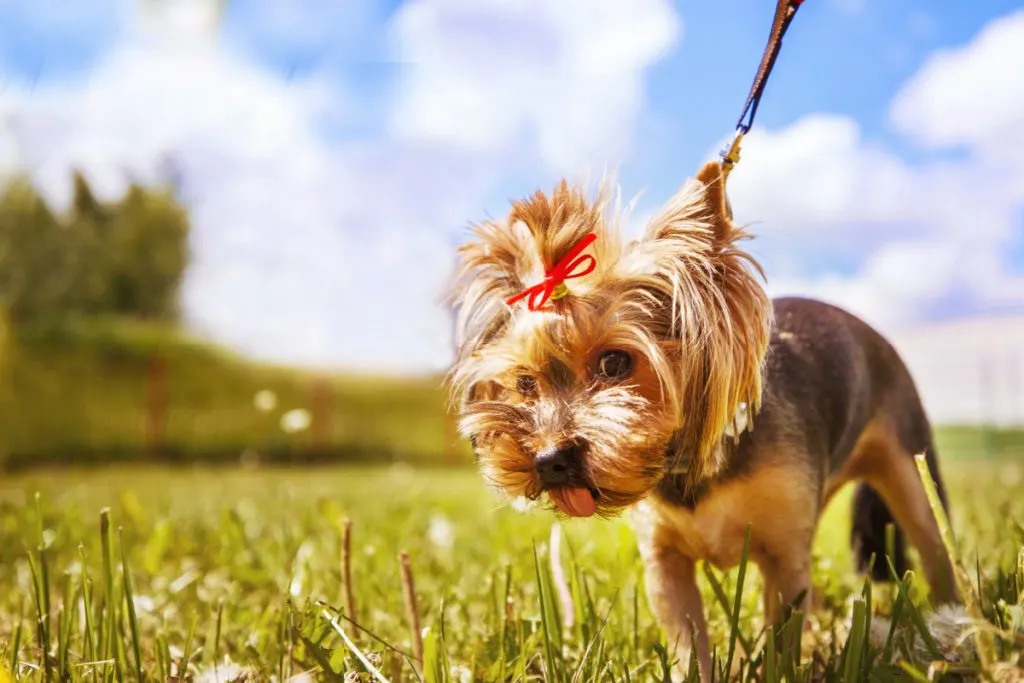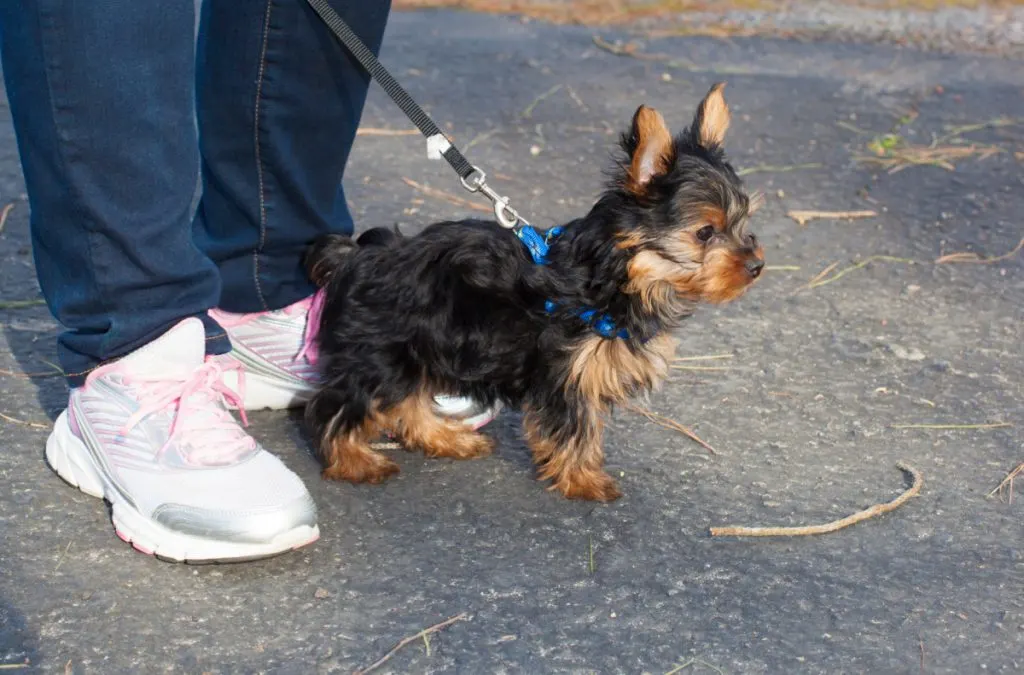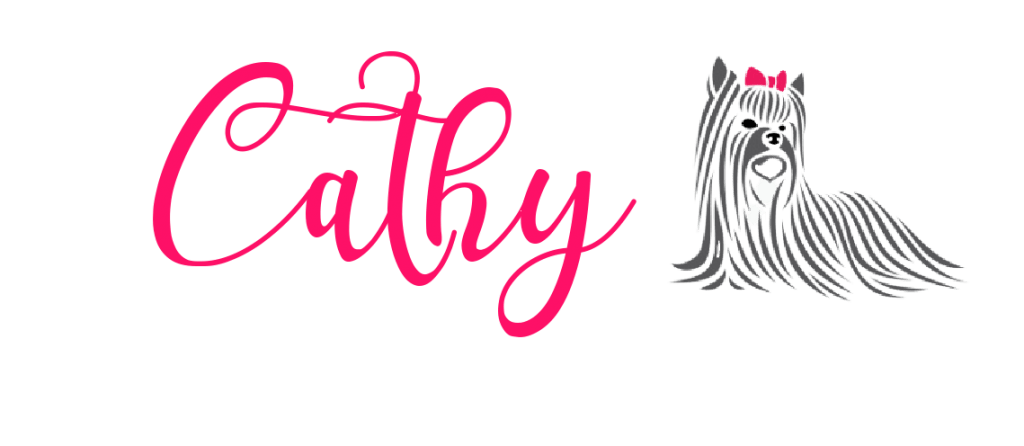As you begin to shop for your Yorkie you will find that there are many things to purchase, but two of the most important things to purchase for your Yorkie’s health and safety are their collar and harness, but not just any collar or harness will do. Let’s discuss what you need to know before making your purchases:
Does My Yorkie Need A Collar Or A Harness Or Both?
Both the collar and the harness are appropriate to have when caring for your Yorkie, but they must be used properly:
Collars
Your Yorkie should wear a collar for safety; the collar should have a bell to alert people to their presence if they are particularly tiny, and a name tag with your contact information to help reunite you quickly in the event that he or she is lost.
Collars should never be used to walk a Yorkie, even for a quick potty break. Keep a collar on whenever your Yorkie goes outside, or if you are hosting guests who are not used to having a dog underfoot to prevent an accident.
Harnesses
Your Yorkie should wear a harness for walks or adventures outside of your home. No matter the length of time you will be out, whether it be a five minute potty break, a ride in the car, a walk, or a longer outing, a harness is the safest choice when compared to a collar.
They should not wear harnesses all the time; constantly wearing a harness may cause matting and is uncomfortable.
Pros and Cons of Collars

Collars have good and bad qualities depending on the characteristics of your chosen product and how they are used:
Pros of Collars
General Safety: When collars have a bell attached, they can help people be aware of your Yorkie’s presence. This is particularly important if you have people in your home who are not used to such a petite dog running around; the bell can protect him or her from being stepped on, kicked, sat on, or following them out a door.
Expediting Reunions: If your Yorkie is lost, a name tag or collar with embroidered contact information is the quickest way to be reunited; anyone who finds your dog can call you right away.
While microchips should also be used in case the collar comes off, the average person does not have access to a microchip reader, delaying your Yorkie getting back to you. As such, collars should be worn to keep your contact information on your Yorkie.
Cons of Collars
Escape risk: It is easy for a dog to escape from a collar by pulling backwards or whipping his or her head to the side, as opposed to a harness that is attached to more of their body.
Strangulation risk: Collars with a metal buckle similar to what you might find on a human’s belt pose a strangulation risk; if your Yorkie’s collar gets stuck on something, the metal buckle will not break loose. To prevent strangulation, always choose a collar with a plastic safety release feature, never a metal belt buckle style closure.
Trachea damage risk: Due to the Yorkie’s small stature, their trachea is more fragile than some larger breeds of dogs. However, no matter the breed, the average dog will not be deterred from pulling against the collar, evidenced by the fact that many dogs will vomit or spit up if they are walked only in a collar on a long walk due to the amount of pulling they did. Some dogs are prone to their trachea collapsing, while others will damage their trachea by pulling against their collar over time. To protect your Yorkie, the best choice is to only use a harness when they will be on leash.
How To Choose A Collar
To find the right collar for your Yorkie, follow these tips:
Measure your Yorkie’s neck. Use a flexible tape measure that tailors use. If you do not have one at home, most grocery stores sell mini sewing repair kits and these often include these types of tape measures. Alternatively, you may find them at a craft supply store.
Check the other section. Most cat collars are less wide than even the smallest size dog collars, and if you need an even smaller size, ferret collars may be ideal for the most petite of Yorkies.
They both usually have bells attached and a good plastic safety release feature.
Make sure it fits properly. A collar should allow for two fingers, your index and middle fingers, to fit snugly but comfortably between the collar and your Yorkie’s neck. If the collar allows for excess or no wiggle room, it does not fit properly.
An improper fit can increase the risk of the collar being caught on something or injuring your Yorkie’s neck.
Search for safety over fashion. Sometimes a collar that looks cute may not be as safe, so be ready to search diligently and do not compromise. Search for a collar with the aforementioned safety features to protect your Yorkie.
Thankfully, there are thousands of collars to choose from, so you will likely be able to find something that you like that is safe.
Choose the right style. There are many styles of collars to choose from. The traditional nylon strap with a plastic safety release buckle is generally the best choice for the purposes I have recommended.
Avoid “choke chains” as they are unsafe for such a petite breed (and unhealthy for larger breeds). Martingale style collars are virtually escape-proof, but because they operate similarly to choke chains, it is best to avoid these as well.
Look for the right material. Collars are made from a variety of materials, but most often are either nylon, leather, or metal chains.
For the purposes described herein, nylon is usually the best choice and the most commonly found option. While leather can be esthetically pleasing, most leather collars feature the metal belt buckle that is considered unsafe.
Metal chains are often featured in “choke chains” or martingales, which again is not appropriate for a Yorkie.
Look for something easy to clean. Collars can get stinky if they are worn frequently, so look for a material that can be washed easily, such as nylon.
Pros and Cons of Harnesses

Harnesses are more ideal than collars in many ways but they are not perfect:
Pros of a Harness
- Overall Safety: There is less chance of a Yorkie escaping from a harness. They also protect your Yorkie’s trachea and neck from being injured if they pull against them or if you must restrain them.
- Harnesses offer more control of your Yorkie than collars do: if you needed to pull your Yorkie back to you in an emergency situation, a harness would do that more effectively and more safely than a collar would.
Cons of a Harness
- Escape risk: If a harness is not properly fitted, a dog could slip out of it. Most harnesses are not completely escape proof in general, but they require a more intentional and careful fitting than collars to be secure.
- Installation and fitting: Some harnesses are more difficult to get on than collars. You might need to set aside some time to properly fit it and practice getting it on properly so that you do not struggle when you are trying to get it on quickly.
- Name tags: There are not many good ways to attach a name tag to most harnesses without it rubbing against the dog, necessitating a separate collar.
How To Choose A Harness
When shopping for a harness, look for the following qualities:
Measure your dog. Using a flexible tape measure, available at craft stores or in the sewing section of stores such as Walmart, you will need to measure your dog around their neck as you would for a collar, and also their girth. The girth is the largest part of their rib cage, right behind their front legs, also known as the circumference, measured across the armpit area.
Search for a harness that features the right type of buckle. Search for a side release buckle like you might find on a backpack strap, as these usually are easier to use efficiently and help the harness fit better.
A belt buckle type closure may not allow you to fit the harness properly since you need a bit of excess to properly operate it. Also avoid nesting buckles, as these can easily come apart and also require excess harness length to properly attach.
Search for something that you find easy to put on. We all have different tastes and approaches; some pet parents find certain types of harnesses easier to use than others. Find the one that you find the most simple to put on so that if you have to put it on quickly, it is doable for you.
Search for a machine-washable harness. A machine-washable harness is a necessity. Harnesses often get the dirtiest of all a dog’s accessories because they are lowest to the ground, and in the case of male dogs, they may be in the “line of fire” when they urinate.
Examples of Recommended Products
Here are some examples of good choices for collars and harnesses:
Collars
GoTags Nylon Personalized Reflective Breakaway Cat Collar with Bell
The GoTags Nylon Personalized Reflective Breakaway Cat Collar with Bell can be customized with your Yorkie’s name and your phone number, which prevents the possibility of a name tag being lost. The bell alerts humans to your Yorkie’s presence for safety. This collar also features a reflective stripe, ideal for visibility in low light conditions.
Frisco Nylon Personalized Dog Collar
The Frisco Nylon Personalized Dog Collar is another practical choice; thin and lightweight, it is ideal for keeping your Yorkie’s ID information on without being cumbersome. Embroider your phone number and your Yorkie’s name directly onto the collar to save money as opposed to buying an additional dog tag.
Harnesses
DOGO Pet Easy Go Harness
The absolute best harness for petite dogs is the DOGO Pet Easy Go Harness. They are easy to get on and off, virtually escape-proof, and easy to wash.
Frisco Nylon Step In Back Clip Dog Harness
The Frisco Nylon Step In Back Clip Dog Harness is a very simple design and it is highly adjustable to help you get the best fit.
Safety Tips
Keep these safety tips in mind as you shop for collars and harnesses:
- Do not keep your Yorkie’s collar and harness on all the time. Only put your Yorkie’s collar and harness on when you go for outings, whether it be a fast potty break, a walk or a longer adventure. If your Yorkie needs to wear his or her collar all day, be sure to remove it at night to give their coat a break. If left on constantly, they can cause matting or rub your Yorkie raw.
- Never crate a Yorkie in a collar. If he or she was to get the collar caught on the crate, they could strangle themselves.
- Remove your Yorkie’s collar before allowing him or her to play with other dogs. The other dog could get his or her jaw underneath the collar and strangle your Yorkie.
- Never walk your Yorkie solely with a collar to prevent escape and damage to the trachea or neck.
- When walking your Yorkie, attach the leash to both the harness and collar simultaneously to decrease the chance of escape and offer you more control.
- Ensure that your Yorkie’s harness fits properly before going outdoors or outside of a securely fenced area to prevent them being able to slip out of it.
- Do not lift your Yorkie by the collar and remember that most harnesses are not designed to support a dog’s body weight; to prevent dropping your Yorkie it is best to lift them up with one hand underneath the tummy.
Conclusion
A collar should only be used to help people be aware of your Yorkie’s presence and hold your contact information for emergencies. A harness should always be used for walking your Yorkie.
Do you have a favorite brand or type of collar or harness? Share in the comments why you love it.
ALSO READ:
How to fit and pick a harness for Yorkie puppies


Cathy Bendzunas
Dog Blogger, Former Dog Groomer
I have adored Yorkies for well over 50 years. As a young adult, I began to show and breed them. Now, I just write about them and have several in my little pack of small dogs.
I have had dogs all my life and have trained as a dog groomer. I also have been a kennel worker, worked in a pet hotel through PetSmart, and still am a pet sitter.
Check out my bio for more information about me.

